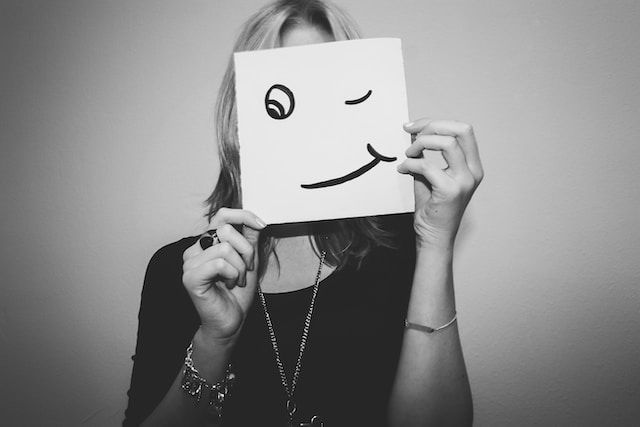Wearing Masks
This episode contains strong language. Listener discretion is advised.
As humans, we frequently wear masks to conceal our true selves in many facets of our life. We tend to portray a curated image of ourselves to the public, whether in personal relationships, professional situations, or even among ourselves. But what happens when we remove those masks and allow ourselves to be completely honest?
On the podcast this week, I met up with Kim Gross, the founder and creator of the 5-Step Power Pathway. She helps people pleasers and perfectionists who have spent a lifetime of perpetual suffering because they have identified with these patterns. She helps guide clients on a journey of self-healing so that they can have more meaningful connections and have the courage to create the life they desire.
As a recovering codependent, she helps people to go from perfectionism and people pleasing to powerful.
She spent a lifetime pleasing and perfecting and all the while losing herself in the roles that she played. It is her passion and desire to help others to create real and meaningful relationships and create the inner power to "Dare Greatly" as they create the life they desire.
“We understand how dangerous a mask can be. We all become what we pretend to be.”
- Patrick Rothfuss
In this post, we'll look at the metaphor of "removing our masks" and the value of authenticity in our personal and professional lives. Next, we'll look at the negative repercussions of wearing masks, such as the psychological toll it takes on us and the effects it has on our relationships and success. We will discuss the advantages of removing our masks and we will consider ways to remove our masks. So, let's get started and investigate the power of authenticity!
What Does "Taking Off Our Masks" Mean?
The metaphor of "taking off our masks" relates to removing our public personas and unveiling our genuine selves. We often need to put on a mask to fit in, be accepted, or cover our vulnerabilities. We may feel compelled to project a particular image or to meet cultural expectations.
At work, for example, we may put on a professional mask, presenting ourselves as polished, confident, and capable, even if we are dealing with insecurities or uncertainties. Similarly, in personal interactions, we may be happy and content even when we feel overwhelmed or anxious.

Wearing a mask can be taxing, resulting in feelings of alienation, isolation, and even melancholy. Taking off our masks can help us be more vulnerable and authentic, embrace our true selves, flaws and all, and connect on a deeper level with others.
By removing our masks, we allow ourselves to be seen and understood while also making room for others to do the same. As a result, we may strengthen and deepen our relationships with others, resulting in a better sense of contentment and happiness in our lives.
The Significance of Authenticity
Being true to yourself, honest, and transparent is referred to as authenticity. It's the opposite of putting on a mask and pretending to be someone we're not. Being honest entails admitting and expressing our true feelings, emotions, and opinions, even if they contradict cultural standards or expectations.
For various reasons, authenticity is crucial in both personal and professional life. Being truthful in personal relationships allows us to form authentic connections with others. When we are genuine, we are more likely to attract others who value us for who we are rather than who we are attempting to be. Being open about our emotions and vulnerabilities can strengthen our bonds with people and foster a sense of trust and intimacy.

Authenticity is essential in the professional world for developing solid and trustworthy connections with colleagues and clients. We are more likely to be viewed as genuine and reliable when we are authentic in our profession, which can lead to tremendous success and job happiness. Furthermore, being genuine can assist us in identifying and pursuing professional options that correspond with our beliefs and interests. This will result in a deeper sense of fulfillment and purpose.
Furthermore, sincerity is necessary for our mental and emotional health. We may feel as if we are continually hiding a part of ourselves when we wear masks, which can lead to anxiety, stress, and alienation. Being authentic allows us to embrace our true selves and grow in self-awareness, which leads to increased emotional resilience and general pleasure.
Consequences of Wearing Masks
Wearing masks or appearing to be someone we're not can have a detrimental influence on our life, including psychological costs, implications in personal relationships, and a poor impact on professional success. Some mental consequences include anxiety, sadness, and low self-esteem. Relationship implications can include difficulty creating and keeping relationships, emotional weariness, lack of trust, and codependency. In our professional lives, it may appear as surface-level connections, difficulty communicating, feeling misunderstood, and professional stagnation.

We can definitely improve our mental and emotional wellbeing, develop genuine relationships with others, and find better success and joy in our personal and professional lives by removing our masks and embracing our true selves.
Benefits of Removing Our Masks
Throwing off our masks and embracing our authentic selves can result in a variety of advantages, such as enhanced mental and emotional wellbeing, stronger and more meaningful connections with others, and higher success and contentment in our personal and professional lives.

In our personal lives, we may find increased self-awareness, decreased anxiety and depression, greater emotional resilience, and greater self-acceptance. We may foster greater trust and intimacy, improved communication, and a deeper sense of fulfillment in our relationships. Professionally, we could experience career success, increased confidence, a greater sense of purpose and meaning, and enhanced mental and emotional wellbeing.
Overall, we can have happier and more satisfying lives if we are honest and embrace ourselves without masks.
How to Remove Our Masks
It might not be obvious at first how we can remove these masks we are wearing. Sometimes, we have worn them most of our lives and we may not know who exactly we are without them. We may also experience fear and anxiety at the thought of living authentically and it will take time to peel back the layers and discover who we truly are underneath.
Through self-reflection, communication, and a little bit of courage, we can start to remove our masks and become more authentic. We can start by fostering a stronger sense of self-awareness. And continue to explore our values and beliefs, as well as our anxieties and insecurities. When we understand our true wants and desires, we can find places for progress.

We can start to be honest and open about our thoughts, feelings, and experiences with others to establish trust and intimacy, foster understanding and empathy, deepen relationships, and improve communication. It’s also important to explore clear boundaries with others, explain clearly what it is we actually want, stand up for ourselves, and live authentically, even if it is scary at first.
Over time, these actions will help us become more authentic with ourselves and others. And these steps will allow us to eventually lower our masks and them off entirely. If we move toward who we truly are and how we want to live just a little bit every day, a big shift can occur in our lives and our wellbeing.
The Takeaway
It's easy to put on masks and hide our actual selves in a world that often praises conformity and fitting in. But, this can significantly impact our mental and emotional wellbeing, interpersonal connections, and overall sense of fulfillment and purpose in life.
Throwing off our masks and accepting our true selves is necessary for living a meaningful and satisfying life. Authenticity can lead to enhanced self-awareness, more profound and meaningful connections with others, more success and fulfillment in our personal and professional lives, and a stronger sense of purpose and meaning.

To become more authentic, we can start with self-reflection and introspection, showing our true self to others, setting boundaries, and asserting ourselves. We will begin to feel more authentic and by living an authentic life, we may notice some big shifts in how we think, feel, and act.
So, let’s support and encourage each other to take off our masks and live more authentically.
We can create a world that values individuality, diversity, and authenticity by accepting our genuine selves with all of our perceived flaws and shortcomings. When we are true to ourselves, we can have stronger and more meaningful connections with others, leading to a happier, healthier, and more fulfilled life.
Take off those masks and be free!
